The Supreme Court on Monday rejected a plea from former President Trump to block New York state prosecutors from accessing his tax returns.
The decision allows Manhattan District Attorney Cyrus Vance to gain copies of Trump’s personal financial records from lenders and accountants used by the former president for his business.
A New York state grand jury first issued the criminal subpoena in August 2019. The subpoena has been bogged down in the federal court system as Trump fought to block access to his financial records since then.
In the one-sentence decision, the court declined to hear the appeal from Trump in the case. There were no known dissents in the matter.
“The application for a stay presented to Justice Breyer and referred to the Court is denied,” the line reads on the order list.
Vance’s office welcomed the decision in a tweet.
The work continues.
— Cyrus Vance, Jr. (@ManhattanDA) February 22, 2021
Absent further appeals, the decision allows Vance to enforce the subpoena. The Manhattan prosecutor has indicated in filings in the case that the probe may include allegations of tax fraud and insurance fraud.
But Trump did succeed in blocking prosecutors — and congressional committees — from gaining access to his tax returns for the duration of his presidency. The Supreme Court aided him in that, denying his first appeal against Vance last year while allowing the -then-president to return to the district court for further arguments.
Trump attorney William Consovoy argued in the first round that Trump, as President, was “immune from criminal process.” Consovoy eventually found himself arguing before the Second Circuit Court of Appeals that the NYPD could not investigate Trump for shooting someone on Fifth Avenue until after the conclusion of his presidency.
The Supreme Court eventually struck down that appeal, affirming bedrock principles of criminal law while allowing the then-president to continue delaying.
Before the 2020 election, the New York Times published a series of articles based off of the President’s returns through 2017. That investigation revealed that Trump had taken huge losses across his business empire as the magnate took on millions in unsecured loans, bringing his effective tax rate close to zero.
The Supreme Court’s decision not to hear the appeal came after months of deliberating. It also follows a case filed by two Congressional panels seeking Trump’s tax returns, and after the House Ways and Means Committee sued the IRS in 2019 for the returns after the agency’s leadership refused a request for the documents.
The Biden IRS has yet to rule on the matter.
Another authority apart from the Manhattan DA is investigating Trump’s conduct. In Georgia, the Fulton county prosecutor opened an investigation based on the former president’s attempt to overturn the election result in the state.






